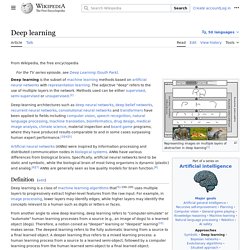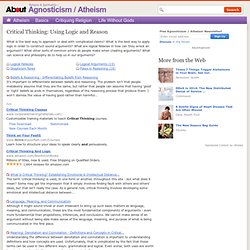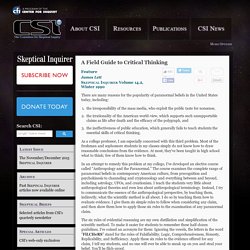

Critical thinking web. Critical thinking. Critical thinking is a type of clear, reasoned thinking.

According to Beyer (1995) Critical thinking means making clear, reasoned judgements. While in the process of critical thinking, ideas should be reasoned and well thought out/judged.[1] The National Council for Excellence in Critical Thinking defines critical thinking as the intellectually disciplined process of actively and skillfully conceptualizing, applying, analyzing, synthesizing, and/or evaluating information gathered from, or generated by, observation, experience, reflection, reasoning, or communication, as a guide to belief and action.'[2] Etymology[edit] In the term critical thinking, the word critical, (Grk. κριτικός = kritikos = "critic") derives from the word critic, and identifies the intellectual capacity and the means "of judging", "of judgement", "for judging", and of being "able to discern".[3] Definitions[edit] According to the field of inquiry [weasel words], critical thinking is defined as: Skills[edit] In sum:
Deep learning. Branch of machine learning Deep learning (also known as deep structured learning or differential programming) is part of a broader family of machine learning methods based on artificial neural networks with representation learning.

Learning can be supervised, semi-supervised or unsupervised.[1][2][3] Deep learning architectures such as deep neural networks, deep belief networks, recurrent neural networks and convolutional neural networks have been applied to fields including computer vision, speech recognition, natural language processing, audio recognition, social network filtering, machine translation, bioinformatics, drug design, medical image analysis, material inspection and board game programs, where they have produced results comparable to and in some cases surpassing human expert performance.[4][5][6] Artificial neural networks (ANNs) were inspired by information processing and distributed communication nodes in biological systems.
Definition[edit] Overview[edit] History[edit] Critical Thinking: Using Logic and Reason. What is the best way to approach or deal with complicated claims?

What is the best way to apply logic in order to construct sound arguments? What are logical fallacies in how can they wreck an argument? What other sorts of common errors do people make when creating arguments? What can science and philosophy do to help us in our arguments? Beliefs & Reasoning - Differentiating Beliefs from ReasoningIt's important to differentiate between beliefs and reasoning. What is Critical Thinking? Language, Meaning, and CommunicationAlthough it might sound trivial or even irrelevant to bring up such basic matters as language, meaning, and communication, these are the most fundamental components of arguments - even more fundamental than propositions, inferences, and conclusions. Meaning: Denotation and Connotation - Definitions and Concepts in Critical...Understanding the difference between denotation and connotation is important to understanding definitions and how concepts are used.
A Field Guide to Critical Thinking. Feature James Lett Skeptical Inquirer Volume 14.2, Winter 1990 There are many reasons for the popularity of paranormal beliefs in the United States today, including: the irresponsibility of the mass media, who exploit the public taste for nonsense,the irrationality of the American world-view, which supports such unsupportable claims as life after death and the efficacy of the polygraph, andthe ineffectiveness of public education, which generally fails to teach students the essential skills of critical thinking.

As a college professor, I am especially concerned with this third problem. In an attempt to remedy this problem at my college, I've developed an elective course called “Anthropology and the Paranormal.” The six rules of evidential reasoning are my own distillation and simplification of the scientific method. Falsifiability It must be possible to conceive of evidence that would prove the claim false. Additional examples of multiple outs abound in the realm of the paranormal. Logic.